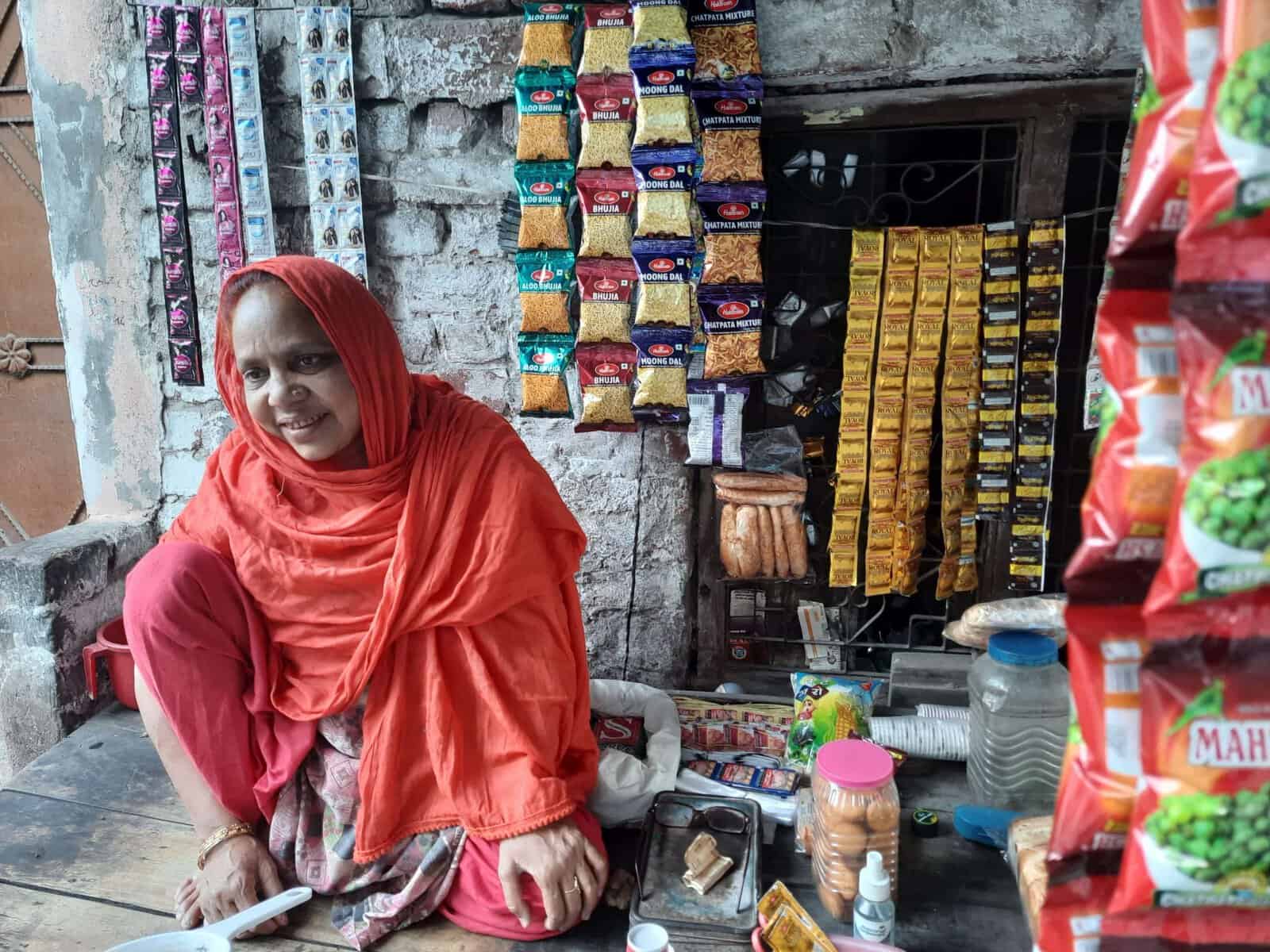Our Response to the Covid-19 Pandemic
Since 2020, the Sadbhavana Trust has led vigorous efforts to help mitigate the devastation wrought by the Covid-19 pandemic. The communities we work with have still not recovered from livelihood losses since the declaration of a sudden nationwide lockdown in March 2020, which was followed by another in April 2021. Many families also lost sole earning members, which resulted in women and girls facing extreme poverty and hunger with a doubled workload and increased violence. The urban slum areas that we work in have poor access to health and other welfare services, conditions that were exacerbated during the pandemic. Misinformation on the pandemic also spread through WhatsApp forwards and other digital platforms.
The impact of the pandemic was heavily gendered. There was wide-scale disruption of girls’ education due to the lack of resources and opportunities to study online, many dropping out altogether. Women and girls from our community were confronted with a spectrum of health issues such as malnutrition, sexual and reproductive problems, and mental health conditions. The impact of the pandemic was even harsher on women typically on the fringes of society, such as single women and disabled women.
Covid Relief and Campaign Work
Covid First-wave Relief Work
Covid Second-wave Relief Work
Our Strategies
Our strategies have evolved over the different phases of the three waves (2020-2022). In the first wave, we provided immediate emergency relief in the form of ration kits, and health and hygiene support to community girls and women. We used social media platforms to disseminate science-based information regarding the pandemic to offer the community clarity in a time of crisis. Other strategies such as livelihood support which began as a crisis response have now grown into new areas of work or been integrated into our ongoing work. Our approach has been to involve our young leaders who graduated from our courses to identify needs as well as implement short- and long-term relief work.
Meet a Young Woman Leader
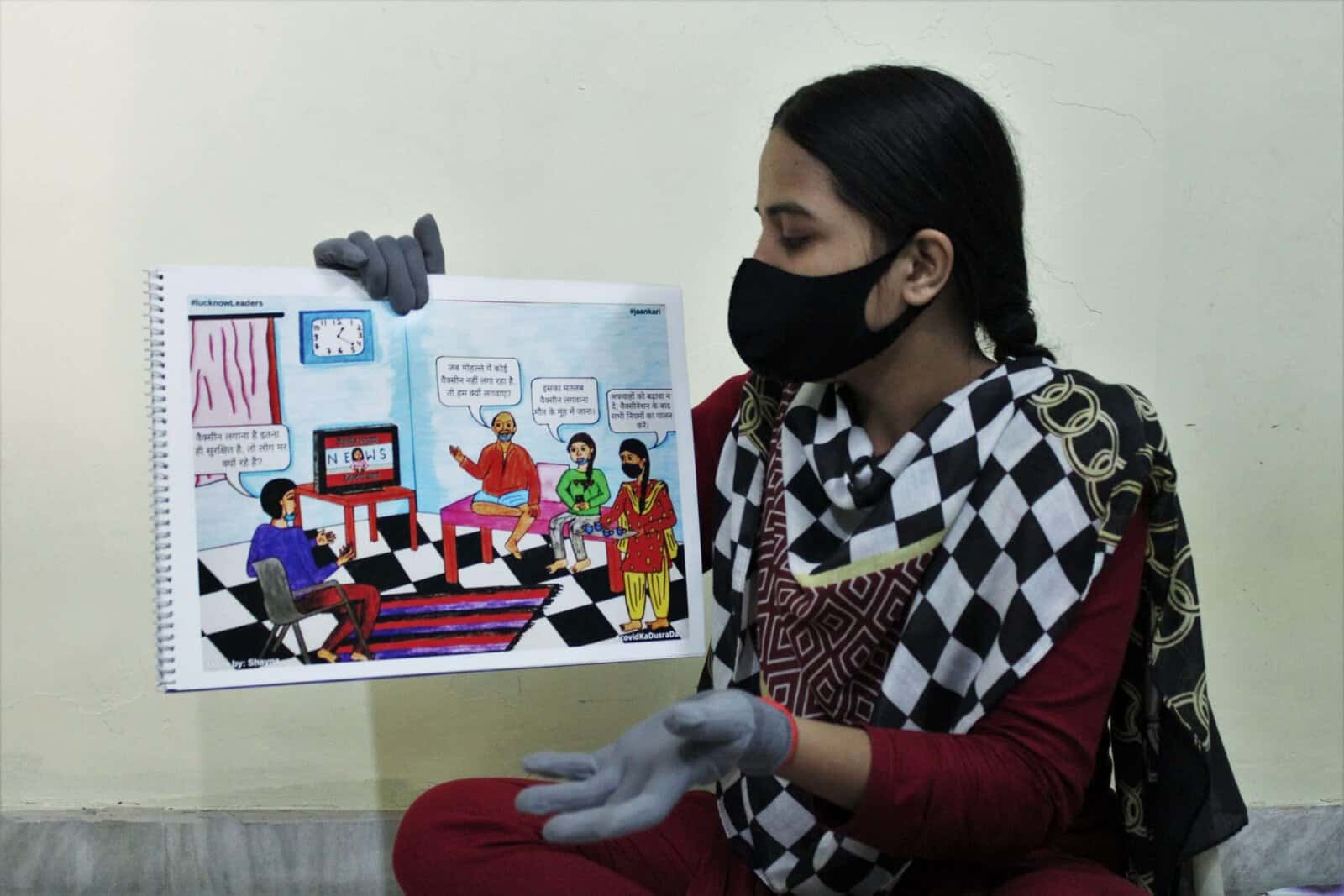
I am Sadaf, a resident of Daliganj, Lucknow. In 2021, I was a part of the vaccination campaign held by the Sadbhavana Trust, where we educated people of the marginalised community on the importance and benefits of the Covid vaccines. Most citizens believed that vaccinations could cause severe side effects, even death, so we aimed at enlightening them on the subject. We went to each allotted area and conducted elaborate discussions with groups of 10-15 people, helping them understand that vaccination was the only way out of the pandemic. We told them about the two vaccinations available at the time, Covaxin and Covishield, the doses required and the time spans involved. We also helped them with registrations. My team and I went to Akbar Nagar, Janta Nagri, Garhikanaura, Radhagram and Daliganj in pairs of two, where we spent about 15 days for the vaccination campaign and two days for the signature campaign.
I went to Daliganj with Saba, another volunteer in this project. We had informal conversations in groups and also handed out hygiene kits to women and girls, containing sanitary pads, masks, sanitisers, a thermometer, medicines, gloves, etc.
We received training before we were sent out to the field. We were told to not force or pressurise anybody, to just politely help them understand the issues. Multiple superstitions and fears prevailed in the communities, which we aimed at eradicating through our conversations, the outcome of which were mostly positive. We found that most people had only heard about the vaccinations through politicians or celebrities, which led them to think it was all “for show”. The older generations thought it was a way for the government to sterilise young people. We also held a signature campaign, where out of 265 people about 50 agreed to get themselves vaccinated.
My experience working on this project was wonderful. I got an opportunity to help the people of our community understand how essential vaccination is for them. I also learnt how to interact with people and how to respond to them in a way that would leave them feeling validated and reassured. My biggest lesson was learning that you can never be completely prepared for the kind of questions that might come your way in the field. All you can do is have faith and trust yourself. I feel that the Sadbhavana Trust has played a huge role in the community right from the beginning of the pandemic, by providing information, giving out hygiene kits to the girls, giving women rations or funds or sewing machines so they could earn a livelihood. In most households, people had just one mask that they would all share and re-use, no one had sanitisers or even medicines. The hygiene kit contained all these essentials, which I feel helped promote their well-being and safety.
STRATEGY 1
Immediate Response to the Pandemic
In the first phase of the first lockdown (March-June, 2020), Sadbhavana Trust team understood that the work planned in the field had to be refocused and the immediate issues of loss of income and lack of household essentials had to be prioritised. It was decided that field mobilisers would identify the most marginalised and disadvantaged individuals/families, especially single women who were also sole caregivers to their children, and compile a list of these individuals. The next step was to sort these names collected from each mohalla forum and create a master list area wise. Detailed profiles of each individual from the final list were created to assess the most vulnerable families. Keeping Covid protocols in mind, one community leader from the area was given the responsibility of putting together the kits for distribution. She in turn made a team of four for the task. Next, the team embarked on the task of distribution. In this way, we supported 750 families with a dry ration kit that included rice, lentils, oil, sugar and tea adequate for one month.
In the second wave (April-June, 2021), we realised that the families needed ration support for at least two months. This wave witnessed multiple families losing earning members and women and girls being forced to sell jewellery and other household objects to survive. A total of 1,610 families was supported in the second wave with dry ration kits; 50 families that had medical emergencies were provided with cash transfers of 3,000 rupees; 1,000 women and girls were provided with hygiene kits (containing sanitary napkins, masks, sanitisers, paracetamol, thermometer and gloves) across all field areas. The girls leading this effort were also given 25 medical kits for their own protection.
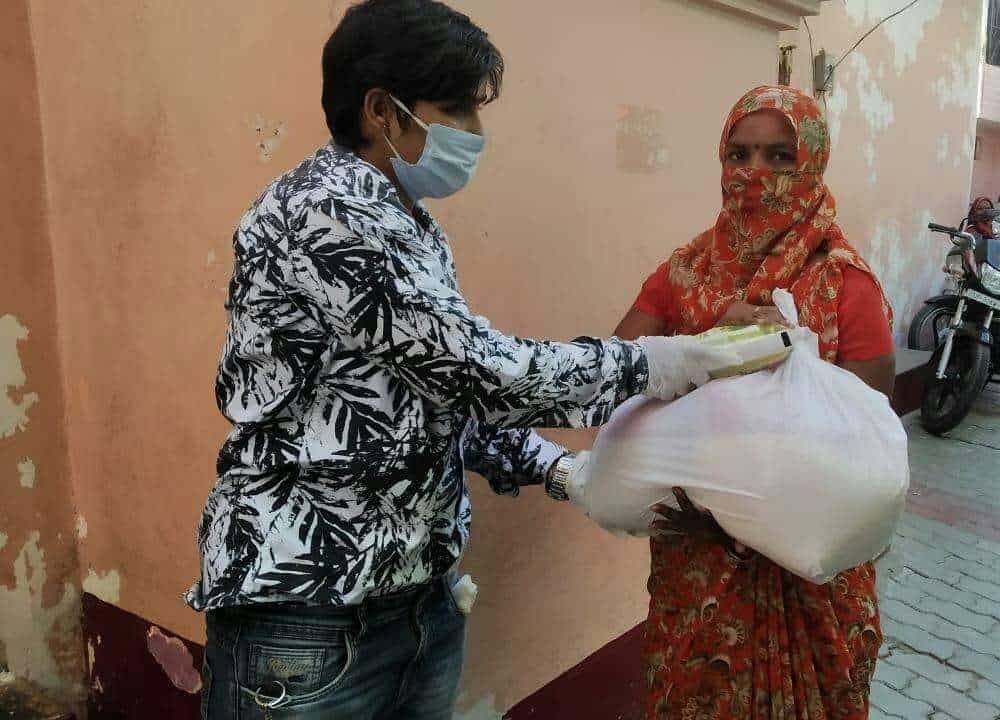
STRATEGY 2
Social Media Communications Programme
Lucknow Leaders emerged as the voices of the marginalised women and girls in the community areas. They started documenting the everyday experiences of people living with the reality of no income, having to drop out of educational institutions, and bearing increased levels of work as well as violence. During the first wave, our program the Sheherbandi (‘lockdown’) series, was run on three central themes:
INFORMATION DISSEMINATION (#JAANKARI)
REMINISCENCE (#AAPBEETI)
ENTERTAINMENT (#TIMEPASS)
The series continued in the second wave. The context was similar but this time the community understood the gravity of the situation better. The series showcased, on social media, emergencies at the ground level households losing earning members, girls dropping out of educational institutions, and women losing livelihoods. Along with this, the social media team also found women across Lucknow in various professions to talk about their work and their presence in digital media, and the kind of gender disparities they face. This was a film series that was part of a research project that the Lucknow Leaders took up to ascertain women’s participation in the virtual world.
With the help of girl leaders, Sadbhavana Trust conducted a vaccination campaign in all field areas to address the misinformation and misconceptions that plagued the community and to help them understand the importance of vaccination. A total of 70% of those who attended the campaign – 1,077 individuals registered themselves and got vaccinated.
STRATEGY 3
Addressing Gender-Based Violence and Mental Health Issues
The rise in gender-based violence during the pandemic, especially psychological violence issues faced by adolescent girls and women, was addressed through online and offline campaigns as well as discussions in training sessions for basic and advanced leadership building programs. The girls were included in workshops on GBV issues and they took the lead in providing information on social media. The themes for the International Women’s Day campaign and 16 Days of Activism campaign in 2021 were centrally focused on the violation of young girls’ and women’s human rights, with a focus on forced marriages, poor mental health and psychological trauma. The community leaders and leadership-building program participants developed research questions to conduct field-level fact-finding exercises. This helped identify issues regarding women’s health, education, livelihoods, safety and bodily agency all of which were highlighted in the campaigns, both online and offline to raise awareness at the local level. Stakeholders such as elected ward members, police, lawyers, ASHA and ANM workers were also included. Along with offline awareness building, we also provided information on helplines through webinars and social media posts.
Over the duration of the pandemic, survivors of domestic violence were provided with support. This support was on the basis of their immediate and long term needs, be it for legal counselling and casework or for conflict resolution with legal guidance present for both parties. Along with this, selected survivors of GBV received financial support to renew their sources of income and continue their wards’ education.
STRATEGY 4
Securing Entitlements for the Vulnerable
Our social media team and community leaders conducted field surveys to ascertain the levels of access to government entitlements as well as related discrepancies. At the beginning of the pandemic, a survey was conducted with 1,000 women who were to receive cash through a government scheme. The key finding was that most women did not have their own bank accounts and, even if they did, they did not have complete information on how to access their entitlement. The team then took the initiative to introduce the process to them, also making them aware of other entitlements that they could access. This was integrated into the ongoing women’s programme and strengthened by focused inclusion issues such as women’s health and livelihoods.
STRATEGY 5
Bridging the Digital Divide
The prolonged pandemic made the Sadbhavana Trust team realise that its response must go beyond immediate relief measures. The issue of girls dropping out of educational institutions for lack of phones and access to the internet was addressed by first providing them digital access training. A total of 23 girls received digital literacy training and organising online campaigns by Sadbhavana Trust digital trainers. The Lucknow Leaders used this as an opportunity to train a batch of adolescent girls and young adult women on social media management, including designing campaigns and generating content for social media: 45 girls are the new faces of our social media content creation, all busy digging up stories from the ground level on feminist issues to share on our organisation’s channels. A ‘Community Adda’ that is held with them every week is led by the Lucknow Leaders over Zoom calls. Discussions are held on prevailing socio-economic issues at the country, especially aimed at young girls, which helps build perspectives. They are also provided with regular inputs on technical skill development. With 75 girls in the neighbourhood forums, computer skill development classes and social media management classes were conducted by the graduates of leadership-building batches to digitally empower our mohalla manch girls.
The Sadbhavana Trust team and community leaders have also been part of webinars organised by both the Sadbhavana Trust and other organisations over the past two years as work increasingly shifted to virtual platforms. The team has gone through upskilling of technical capacity. The pandemic proved to be a good learning opportunity for us to plan and execute our work in both online and offline spaces.
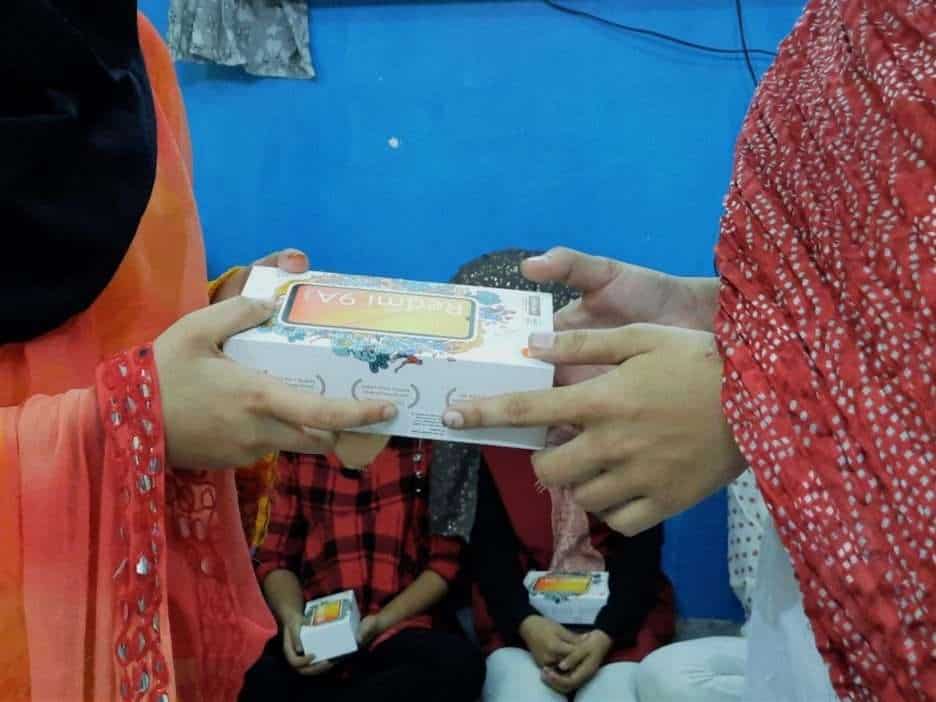
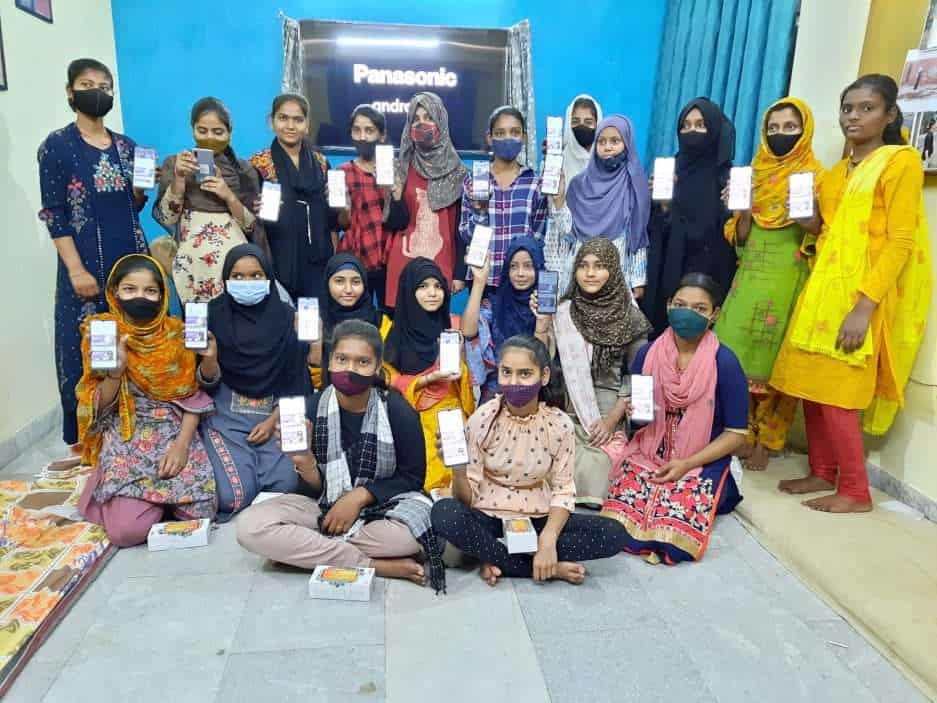
STRATEGY 6
Re-establishing Livelihoods
In the second wave of the pandemic, we first provided financial support to women who had lost their spouses and main income generators in the household. This way, we embraced new areas in our fieldwork. Those women are now associated with the mohalla manch and receive regular inputs on gender perspective-building. They have become a part of Sadbhavana Trust women’s programme and are taking the initiative to find more women like them and bringing them to the manch, thus helping the organisation reach out to a wider group of individuals. A total of 75 women were supported with cash transfers (of either 6,000 or 30,000 rupees) or sewing machines to restart their small businesses.
